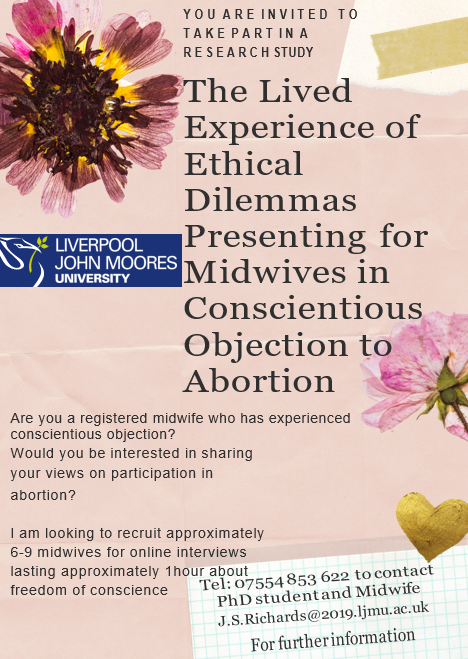The Lived Experience of Midwives’ Ethical Dilemmas in Conscientious Objection to Abortion
By Midwife, writer and lecturer, Jacqueline Richards on 09 November 2021
A qualitative PhD study amongst approximately 6-9 midwives for interviews conducted online. The aim of the study is to capture the lived experience of ethical dilemmas presenting for midwives in conscientious objection (CO) to abortion by exploring decision-making when required in employment to partake in abortion procedures. The logistical impact of CO in midwifery and medico-legal frameworks which offer guidance and support moral integrity will be examined using IPA.
Ethical Approval
Ethical clearance has been achieved through Liverpool John Moores’ University Research Ethical Committee procedures, which have categorised the study as minimal risk to participants. Ref: Richards- 21/NAH/013
About the researcher
Jacqueline Richards is a practising midwife, writer and lecturer, the researcher has a significant portfolio including publications in professional journals on case-loading, mentorship and ethics as well as writing a chapter - The Light at the End of the Tunnel, which examines recovery from eating disorders. This PhD study comprises part of her work for the Conscientious Objection to Abortion Project, based at the Dept. of Nursing and Allied Health, Liverpool John Moores University. To take part, please e-mail Jacqueline Richards at: J.S.Richards@2019.ljmu.ac.uk
Where is this study conducted?
Online
Study type
Interview
How long will the study take to complete?
60 minutes
Study language
English
Participant requirements
UK based Nursing and Midwifery Council registered midwives regardless of CO views and ideological position will be included in the study. Excluded are individuals working in healthcare settings in a student capacity, individuals below 21 years although there is no upper age range.
Instructions
After recruitment, follow-up will be by email from the applicant when a Participant Information Sheet will be sent by e mail. Consent-taking will take place via face-to-face meeting conducted online at a time and place of participants choosing. The applicant will be available to answer queries throughout the research but it is anticipated this is when signed consent will largely take place. Further, there will be approximately three main encounters introductions, including taking consent, interview (lasting 1 hour) and follow up.
Number of Participants
9



